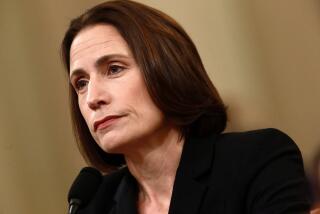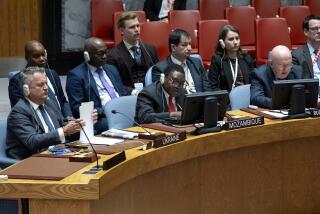The Fox in the Chicken Coop
- Share via
The selection of retired Gen. Alexander Lebed as chief of the Russian Security Council almost surely guarantees Boris Yeltsin’s election as president next month. Yeltsin now has credible force at his disposal to deal with a recalcitrant parliament and demonstrations in the streets, and Russia has a powerful new contender in the struggle to succeed Yeltsin.
In the United States, the Security Council deals with foreign policy, and the national security advisor is an insignificant figure in domestic politics. In Russia, the Security Council includes the heads of the police as well as the military, and it is far more involved in domestic security issues and foreign policy toward the former Soviet republics than foreign policy toward the West.
The United States has treated the Russian election as a struggle between good and evil, between reform and a return to the past, and the prospect of a Lebed-Yeltsin alliance has been greeted in glowing terms. In the future, the United States is likely to look at this development with far less enthusiasm than it does at the present.
In his memoirs, Lebed emphatically portrays himself as a man of decisive action and he gives many examples. He has been as forthright in his views of democracy. He has long praised Gen. Augusto Pinochet of Chile, and in April, he told the party convention nominating him that the legislature should be appointed by the president, not elected. His ads described Yeltsin as a “worthy czar” but in decline, and said that “Czar Lebed,” whose powers “are on the upswing,” is the only alternative to Yeltsin.
In the past, Lebed talked as if he equated privatization with crime and corruption. In the last six months, he has become vocal in his support: of private property while still emphasizing crime and corruption. The general has clearly been giving Russia’s new businessmen the message that he would be like Pinochet, a dictator who also supported capitalist development. However, Lebed does not favor Pinochet’s free trade policies, but the state-oriented, protectionist policies of the Asian dictators of the past and present.
The relations between Yeltsin and Lebed after the election are sure to be touchy. Yeltsin has been extremely sensitive about any politician or advisor who might be independent, let alone who posed a threat. In 1957, Nikita Khrushchev used Marshal Georgy Zhukov to defeat his opposition in the party and then removed him in four months. Unlike Zhukov, Lebed is open in his political ambitions for the highest office, and the Zhukov precedent will surely make Yeltsin and Lebed very nervous about each other.
If Yeltsin decides to try to win Lebed’s loyalty by adopting his policies, the change of course will be dramatic. If Yeltsin returns to his drinking and lethargy, Lebed is likely to seize power. If Yeltsin dies or is disabled and a new election is required, Lebed is almost certain to win. If Yeltsin tries to remove Lebed, the results are unpredictable.
Some in the United States secretly think that Russia needs a Pinochet to introduce stable capitalism, but Lebed would be unlikely to have an agreeable foreign policy. Lebed has recently muted his hostility to the West, but his memoirs are contemptuous of Mikhail Gorbachev and his advisors for their policy toward the West. In 1995, he called NATO a drunken vandal in Bosnia and said the IMF loan to Russia was designed to finance the Chechen war. By all indications, he is deeply concerned about the decline of the Russian state and military.
Events in Russia now are probably out of American control. However, if we continue to insist on a draconian, Pinochet-like economic policy, we multiply the odds that we will get a draconian, Pinochet-like political system--with a Pinochet with a very unpredictable foreign policy.
During the campaign, Yeltsin moved toward the center of the political spectrum. Such a policy would be well-received by the elected legislature. If he breaks his promises, a confrontation with the legislature is possible, but a disillusionment of Russians with democracy is certain.
At home, President Bill Clinton emphasizes job creation, health reform and the protection of Social Security, and at the G-7 meeting he should endorse Yeltsin’s promises of change in economic policy. He should reassure Russians that the West will not push Yeltsin to repudiate his promises after the election.
It is vital that Russians develop the belief that elections matter and will improve their lives. After World War I, Germans took 15 years to lose faith in democracy and capitalism. We should not assume that Russia is out of the woods when the presidency is decided.
More to Read
Sign up for Essential California
The most important California stories and recommendations in your inbox every morning.
You may occasionally receive promotional content from the Los Angeles Times.












